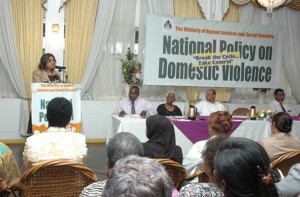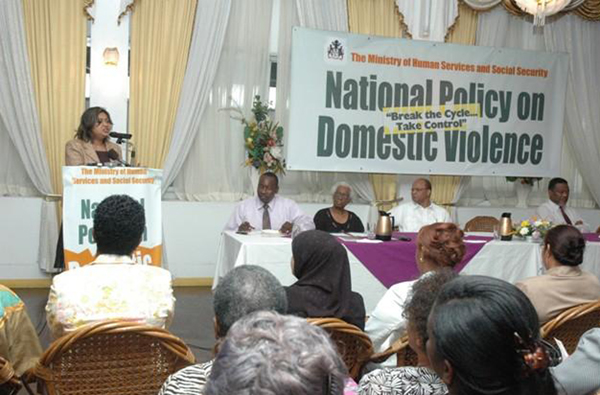–as national policy on domestic violence launched
After years of intensive groundwork, a national policy on domestic violence that seeks to transform attitudes and behaviours has been launched amid calls for broad support particularly in the area of law enforcement.
The violence numbers are too high and there are still many weaknesses in the system, Home Affairs Minister, Clement Rohee, said yesterday at the launch as he declared categorical support for the policy and pledged to, “get the Guyana Police Force working harder and acting more aggressively in this area”.
He said the reluctance often shown by the police with respect to taking reports on domestic violence and following up on cases, points to the fact that they [police] are products of a society that condones violence. But according to Rohee, the time has come for the police to get serious and for the society, particularly men, to do their bit in stamping out all forms of violence.
 The five-year policy, which was launched by Minister of Human Services and Social Security, Priya Manickchand at the Tower Hotel under the theme, ‘Break the Cycle, Take Control’, is a government initiative that will inform and guide future interventions and programmes in the area of domestic violence at a governmental level.
The five-year policy, which was launched by Minister of Human Services and Social Security, Priya Manickchand at the Tower Hotel under the theme, ‘Break the Cycle, Take Control’, is a government initiative that will inform and guide future interventions and programmes in the area of domestic violence at a governmental level.
According to Manickchand, it will not just be a policy on paper since government is fully committed to the transformation process, and she intends to push the policy while drawing on the support of other ministries, faith-based groups, non-governmental organisations, community groups and every citizen.
Figures released at the launch indicate a sharp increase in domestic violence reports in Berbice and a marked reduction in the city and on the East Coast but an overall increase in reported cases for 2007 when compared to 2006.
Around 3,627 reports were made last year while 1,708 were filed in 2006. However, a fair number of cases go unreported. In Berbice, around 300 cases were reported in 2006 but the police reported receiving 1,890 cases last year.
Thematic Areas
The policy contains eight thematic areas. The first pertains to the monitoring and enforcement of legal sanctions. Among the steps to be taken would be the review of the Domestic Violence Act and its implementation, providing the police force with the resources to establish and maintain domestic violence units in each division and the gazetting of competent social workers.
Under the provision of services for survivors, the policy envisages a common service protocol will be implemented involving the health, education and social services sector and the police force. “Reasonable access” will also be ensured by the government to temporary refuges for survivors and the government will ensure that there are appropriate legal aid services to support survivors throughout the country.
With respect to the health sector, all health services will be resourced to provide care to survivors of domestic violence and there will be a standard curriculum on domestic violence intervention.
Thematic area four entails the Ministry of Education working with the Ministry of Human Services to craft public awareness programmes to sensitise students on violence and abuse. Further, the government will support and endorse public education campaigns by apportioning free time on the state broadcast media for public service messages.
Other thematic areas are building the capacity of rural and hinterland communities to respond to domestic violence, intervening on behalf of persons with disabilities and elderly persons.
The final thematic area relates to the monitoring and evaluation of the policy’s implementation and will rely on data gathered from hospitals and health facilities, the police force, the courts and Ministry of Legal Affairs, non-governmental organizations and the Probation and Welfare Department and the Women Affairs Bureau in the Ministry of Human Services and Social Security.
Still many weaknesses
Rohee noted that if the issue of domestic violence is to be seriously tackled then effective legislation must be in place that would empower the police to act beyond the powers they currently have. He said the police must be able to act firmly and decisively after receiving reports.
The Domestic Violence Act already provides the necessary scope for action. A major bugbear for stakeholders and anti-violence advocates is that the police do not use the legislation in the way it is meant to be used.
The minister said that the system in general still has too many weaknesses, adding that one such is the weak monitoring of the perpetrators of violent acts.
“Domestic violence perpetrators should be monitored as we do with deportees who come back into the country,” he said.
He pointed to the lack of support systems being in place for victims of domestic violence noting that this is critical in the fight. Rohee said shelters need to be set up so that women and families who are in need can have a place to go.
According to him, the police are too reluctant when it comes to domestic violence reports and following up on them.
He spoke of making unscheduled visits to stations across the country and checking up on how ranks operate. Based on his findings, Rohee said many stations do things differently when handling domestic violence matters and pointed to some stations recording the reports in an occurrence book while others have a separate book. He said every station should have one book to record such matters separately.
Further, Rohee said, adequate resources to tackle the problem are lacking and this posed a great challenge.
Manickchand said the policy was another step in the battle and agreed that there are still many challenges.
She said the policy was informed by recommendations drawn from various sources including the National Women’s Conversation convened by the Ethnic Relations Commission in 2006.
She added that it would be implemented with vigor.
The policy is to be reviewed annually by an Oversight Committee. The committee will be responsible for monitoring and evaluation of the implementation of the policy and will issue an annual report outlining both successes and failures.
Those who did
not survive
The Rupununi Room at Hotel Tower was packed with persons who turned out for the launch, some from as far as Regions Eight and Ten. Calypsonian Lady Tempest moved the audience with a stirring performance of a piece aptly named, “Stop the Violence” and as her words rang out across the room, eyes were fixed on the mounted display of pictures of the faces of women, men and children who did not survive violence in the last year. Among them were little Sade Stoby from Mocha who was found dead aback the village. She had been sexually molested. There were also photographs of teenagers Omadella Peters and Donnis King; Eileen Lall; Nazleen Mohamed; Nastasha Ramen; Melissa Anthony; Basmattie Seecharran and Aloysia Bernard among 14 others. Also included in the display were newspaper articles dating back as far as 1996 but the recent headlines featured more prominently.
“Girl 9, murdered and dumped”; “Mother stabbed to death in front of her children”; “Rape convicts freed on appeal”; and “Woman remanded for beating child father”, were among some of the headlines.

